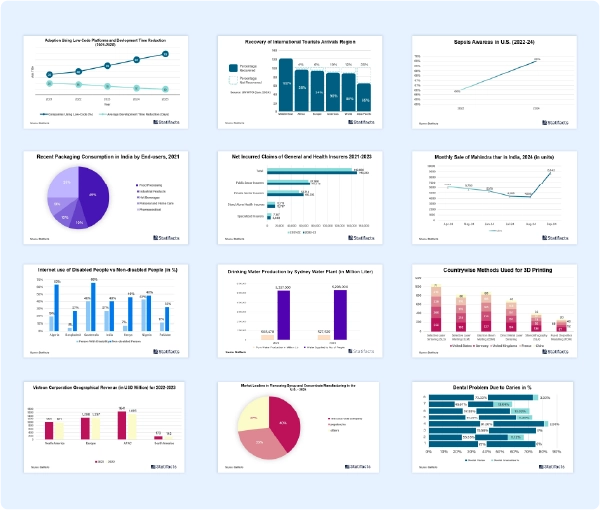The U.S. immunohistochemistry market size was estimated at USD 1,119 million in 2024 and is expected to be worth around USD 1,805 million by 2034, growing at a compound annual growth rate (CAGR) of 4.9% over the forecast period 2025 to 2034.
U.S. Immunohistochemistry Market Report Highlights
- The antibodies segment dominated the market in 2024 and accounted for the largest share of 27.96% owing to the vital usage of antibodies in disease diagnosis and drug testing.
- The kits segment is expected to grow rapidly during the forecast period.
- The diagnostics application segment accounted for the largest revenue share of more than 49.16% in 2024 and is anticipated to maintain its lead over the forecast period.
- In 2024, the hospitals and diagnostic laboratories segment dominated the market and accounted for the largest share of more than 54.76% of the overall revenue.
- Research institutes are expected to register a lucrative CAGR during the forecast period.
U.S. Immunohistochemistry (IHC) is a crucial sector for the healthcare and biotechnology sectors, driven by its vital use in drug development, disease diagnosis, and medical research. IHC helps diagnose diseases such as heart disease, cancer, and infectious diseases by integrating immunological and chemical methods to identify specific antigens in tissues. Antibodies, reagents, image analysis software, and tools are the foremost components offered by the market. the increasing demand for biomarker discovery and improvements in personalised treatment are driving the industry. The use of precision medicine and therapeutic innovations are being transformed by IHC services, which are becoming increasingly popular in research and diagnosis.
The growing incidence of cancer and other chronic illnesses is one of the major factors propelling the Immunohistochemistry industry in the United States. By identifying certain biomarkers such as HER2, PD-L1, AND Ki-67, that are crucial for steering treatment choices and individualised therapy, IHC plays a vital role in the detection and classification of malignancies. The need for advanced diagnostic methods, like automated IHC platforms, has increased due to the growing emphasis on precision medicine. Furthermore, since IHC is crucial for validating biomarkers and assessing therapeutic efficacy,the development of pharmaceutical research and clinical trials for specific drugs additionally contributes to market expansion.
The growing use of automated immunohistochemistry (IHC) equipment is yet another significant driver pushing the expansion of the IHC market in the United States. By eliminating the drawbacks of manual methods, automation improves the accuracy, repeatability, and effectiveness of IHC processes. High-throughput analysis is made possible due to automated platforms, which also save time and minimize human error. This is particularly advantageous for large-scale research facilities and diagnostic labs. Additionally, developments in digital pathology and artificial intelligence are simplifying picture analysis and interpretation even further, resulting in quicker and more accurate diagnostic outcomes. The market is expanding as a result of these technical advancements that are addressing the rising need for trustworthy diagnosis in oncology and other domains.
The need for specialized diagnostic instruments like IHC is greatly fueled by the United States' ageing population. Chronic diseases like cancer, neurological conditions, and heart diseases are more common among older people. By detecting certain biomarkers, IHC is a vital method for diagnosing various diseases. The need for precise techniques is growing which is driving market development.
Furthermore, the adoption of IHC is being driven by increased financing and encouragement for scientific and clinical research from both corporate and commercial entities. These initiatives make it possible to look into emerging biomarkers and create cutting-edge medical and diagnostic tools. IHC is specifically utilized by pharmaceutical firms for preclinical and clinical studies to assess the effectiveness of drugs, particularly in cancer and immunology.
IHC has significantly grown important in detecting pathogens in tissue samples, particularly in light of newly developing infectious illnesses. The COVID-19 pandemic brought attention to the significance of advanced diagnostic techniques, which sparked interest in IHC for both clinical and scientific purposes. The market's application will continue to grow as a result of the current emphasis on infectious illnesses.
Artificial intelligence (AI) is substantially driving growth in the Immunohistochemistry market by improving diagnostic accuracy, scalability, and efficiency. Digital pathology solutions influenced by AI are revolutionising the analysis and interpretation of IHC data. These approaches reduce human error and variability among observers by processing tissue samples and identifying biomarkers more accurately using artificial intelligence algorithms.
Rapid picture processing is made possible by AI, which assists in high-throughput settings like hospitals and research laboratories. Additionally, by finding patterns in intricate datasets, AI-driven solutions aid predictive diagnosis and enable individualized treatment alternatives. By generating precision medicine, this AI integration primarily increases workflow efficiency and opens up new commercial opportunities.
IHC will go through a revolution due to digital pathology and AI-driven technologies that make automated, high-throughput analysis and real-time detection possible. This presents the potential for precision medicine, especially in the field of cancer. IHC is being adopted more as a companion diagnostic technique, especially for immunotherapies and targeted cancer treatments. There will be numerous chances created by this collaboration between diagnostics and treatments. Furthermore, opportunities to enhance diagnostic and research applications are presented by the rising demand for multiplex IHC methods, which enables the simultaneous detection of numerous biomarkers in a single sample.

